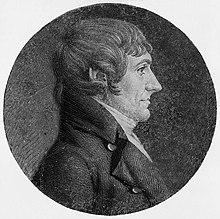William Plumer
William Plumer | |
|---|---|
 | |
| United States Senator from New Hampshire | |
| In office June 17, 1802 – March 4, 1807 | |
| Preceded by | James Sheafe |
| Succeeded by | Nahum Parker |
| 7th Governor of New Hampshire | |
| In office June 5, 1812 – June 3, 1813 June 6, 1816 – June 3, 1819 | |
| Preceded by | John T. Gilman |
| Succeeded by | Samuel Bell |
| Personal details | |
| Born | June 25, 1759 Newburyport, Massachusetts |
| Died | December 22, 1850 (aged 91) Epping, New Hampshire |
| Political party | Democratic-Republican |
| Other political affiliations | Federalist |
| Children | William Plumer, Jr. |
William Plumer (June 25, 1759 – December 22, 1850) was an American lawyer and Baptist lay preacher from Epping, New Hampshire. Born in 1759 in Newburyport, Massachusetts, he represented New Hampshire as a Federalist in the United States Senate from June 17, 1802 to March 4, 1807. Plumer later became a Democratic-Republican and serve as a Governor of New Hampshire, 1812–1813 and 1816–1819.
In the 1820 presidential election, he cast the only dissenting vote in the Electoral College against incumbent President James Monroe, voting instead for John Quincy Adams. While some accounts say that this was to ensure that George Washington remained the only American president unanimously chosen by the Electoral College, others assert that he was instead calling attention to his friend Adams as a potential future presidential candidate, or protesting against the "wasteful extravagance" of the Monroe Administration.[1] Plumer also eschewed voting for Daniel D. Tompkins for Vice President as "grossly intemperate" and having "not that weight of character which his office requires," and also "because he grossly neglected his duty" in his "only" official role as president of the Senate by being "absent nearly three-fourths of the time." Plumer instead voted for Richard Rush.
In 1803, Plumer was one of several New England Federalists who proposed secession from the United States due to lack of support for Federalists, rising influence of Jeffersonian Democrats and the diminished influence of the North due to the Louisiana Purchase.
Plumer was a founder and the first president of the New Hampshire Historical Society. He died in 1850, aged 91, at Epping, New Hampshire.
William Plumer was the father of William Plumer, Jr., who served in the United States House of Representatives.
Works
- Vital Godliness, 5 editions - first published in 1864
- Commentary on Paul's Epistle to the Romans, 4 editions - first published in 1870
- Studies in the book of Psalms, 3 editions - first published in 1867
- Hints and helps in pastoral theology, 3 editions - first published in 1874
- The grace of Christ, 3 editions - first published in 1853
- Thoughts on the religious instruction of the negroes of this country, 3 editions - first published in 1848
- The Rock of Our Salvation, 3 editions - first published in 1867
- Commentary on the epistle of Paul, the apostle, to the Hebrews, 2 editions - first published in 1872
- Jehovah-jireh, 2 editions - first published in 1867
- The Law Of God As Contained In The Ten Commandments, Explained And Enforced, 2 editions - first published in 2007
- Am I self-deceived?, 1840
- The Bible true, and infidelity wicked, 1840
- The Law of God, 1998
- Psalms, 1975
- Psalms (Geneva), 1978
- Rome against the Bible, 1854
- Young children may be truly pious, 1850
- Scripture doctrine of a call to the work of the gospel ministry, 1832
- Words of truth and love, 1867
- Truths for the people, 1875
- Earnest hours, 1869
- How to bring up children, 1822
- The promises of God, 1872
- The substance of an argument against the indiscriminate incorporation of churches and religious societies, 1847
References
- ^ "How Important is One Vote?" (PDF). The NSC Foghorn. 5 (9): 6.
External links
- 1759 births
- 1850 deaths
- People from Newburyport, Massachusetts
- Baptists from the United States
- American people of English descent
- New Hampshire Federalists
- New Hampshire Democratic-Republicans
- Governors of New Hampshire
- Faithless electors
- United States Senators from New Hampshire
- Federalist Party United States Senators


